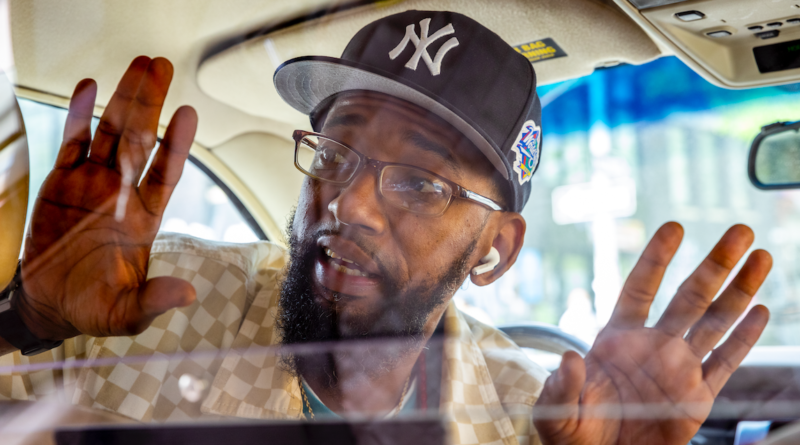INTERVIEW: ‘Taxilandia’ extends in Brooklyn, while West Coast production in the works
Photo: Modesto Flako Jimenez is the creator and writer of Taxilandia. Photo courtesy of Maria Baranova / Provided by Matt Ross PR with permission.
Taxilandia, the new theatrical experience by Modesto Flako Jimenez, recently extended until May 30. Audiences can engage with this unique piece of art in a number of ways: via the Taxilandia Gallery, Textilandia or Taxi Rides With Flako.
The experience is billed as a site-specific play-within-a-ride of a city, and audience members are able to immerse themselves in the sights and sounds of a “neighborhood confronting social stigmas and the realities of gentrification.” Jimenez weaves together a commentary on the idea of being a local, an immigrant and a resident of a neighborhood, and there are thoughts shared on class, race, history and culture along the way.
This form of Taxilandia takes place in Bushwick, Brooklyn, where Jimenez drove a taxicab for nine years. Other companies around the United States are developing their own versions of the show, and a West Coast production is already being planned.
There are many producers behind the project, including Oye Group (where Jimenez serves as artistic director), New York Theatre Workshop, The Bushwick Starr and The Tank. Taxilandia Gallery offers patrons the chance to experience the sights, sounds and history of Bushwick through original poetry, video and sound design work, and a connection to a local business, according to a press release. Then there’s Textilandia, which is a “new text message experience” from Jimenez and Andrew Kircher. Audience members walk a personal journey on blocks “haunted with a deep history of conflict, perseverance and joy.” Perhaps the most anticipated of the offerings: Taxi Rides With Flako. Tickets for this exclusive experience are $25 and won via a lottery.
Recently Hollywood Soapbox exchanged emails with Jimenez, a Dominican-born, Bushwick-raised theater maker, producer and educator. He has a long relationship with Oye Group, the company he founded, and previously performed at The Public Theater’s Under the Radar Festival in Oye for My Dear Brooklyn. He has also worked with TEDxBushwick, the Wooster Group, The Bushwick Starr, JACK and the Brooklyn Academy of Music, among other companies and venues. Questions and answers have been slightly edited for style.
What can audience members expect when they travel to Taxilandia? Are there different experiences?
They can expect a journey through a neighborhood and different mediums about how to experience art in a pandemic; experience poetry and local artists; and receive the story of an actor-poet, former cab driver and how his neighborhood is rapidly being pillaged with no support or care — a site-specific piece and journey through Bushwick, Brooklyn, from the days of the Lenape, through Dutch and French colonization, through now — all through the back of a cab and hear the story of gentrification through the tapestry of human history, experience and truth.
What does the performance piece say about gentrification and the changes that are occurring in New York City?
People have reworked language and forgotten that gentrification is a form of colonization — the term “gentrification” is over 50 years old, and we’ve experienced a mass cultural forgetting about the origins of the practice and term; instead of colonizing states and nations, entire neighborhoods and communities are the subject of hyper-local colonization. People are not trying to address the actual humans in the community but replacing the dialogue with discussions about money and market values.
How much of this piece is influenced by your own experiences in Bushwick, Brooklyn?
The whole piece is influenced by my life in Brooklyn — it’s trying to address white people attempting to make capital and put up tours of Bushwick, and while I recognize the broke artist life, but as artists, they also have a duty to address displacement and issues within the neighborhood they’re engaging with and not treat it, and the real people who live in it, as opportunities for income. One of the many reasons I started Taxilandia was because artists who did not have the knowledge about the local artists, the history of the buildings, the history of the neighborhood were trying to tell these stories without respect or knowledge regarding it.
What’s the future for the piece beyond the end of May?
Taxilandia will be moving to San Diego and engaging with the same goals as Taxilandia in Bushwick — trying to engage and reckon with gentrification, displacement and the uplifting of local artists in the communities being gentrified.
How difficult has this past year been — as an artist, as a human, as a resident of New York City?
Two sides — one side is really fulfilling because I can still make art and be challenged by the pandemic in the ways I continue to create and be safe in these conditions, as well as allow for enjoyment without worries about being sick and bring capital to local businesses. On the other side of that coin it’s disheartening that the funding that has happened in the arts that is intended towards communities has been instead used to keep people’s salaries going.
By John Soltes / Publisher / John@HollywoodSoapbox.com
Taxilandia continues through May 30. Click here for more information and tickets.

